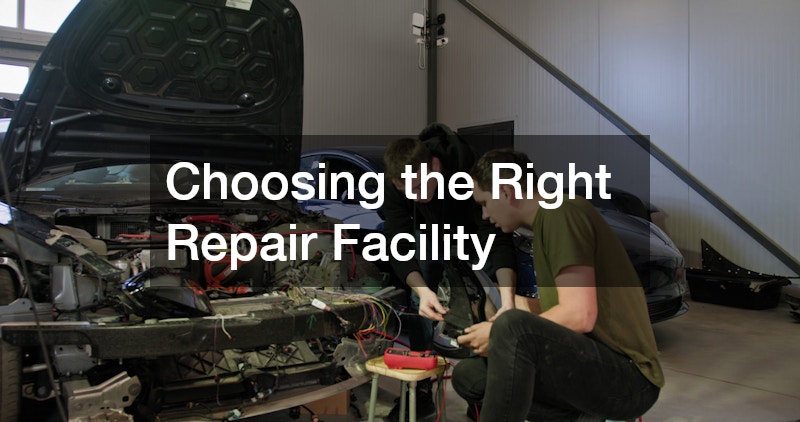Maintaining your vehicle doesn’t have to be overwhelming. With the right checklist and attention to detail, every car owner can keep their vehicle running smoothly, avoid costly breakdowns, and extend the life of their car. While some repairs are best left to professionals, knowing what to watch for empowers you to make smart decisions and catch problems early. Whether you drive a compact sedan or a heavy-duty pickup, understanding the essential repairs your vehicle may need can lead to safer driving and greater reliability. Use this ultimate auto repair checklist to navigate the most critical aspects of vehicle maintenance and keep your car in top condition. This guide also includes insights into how your local electrical mechanic shop can help with both routine and complex services.
1. Transmission Troubles Should Never Be Ignored
The transmission is one of the most complex and essential systems in your car. It’s responsible for transferring power from the engine to the wheels. Over time, the gears and internal components can wear down, especially if the fluid hasn’t been changed regularly. When a transmission starts to slip, make strange noises, or delay shifting, it may be time for an auto transmission rebuild. This process involves disassembling the transmission, inspecting every component, replacing worn parts, and reassembling it to factory specifications. It’s a major repair, but often much more affordable than a complete replacement. Many drivers aren’t aware of transmission issues until they become severe, so early diagnosis is key. An experienced electrical mechanic shop can perform diagnostic scans, fluid inspections, and road tests to determine if a rebuild is necessary. Keeping an eye out for burning smells, fluid leaks, or dashboard warning lights can help prevent catastrophic failure. Regular maintenance, like fluid flushes, is critical to keeping your transmission healthy. If you tow heavy loads or drive in extreme temperatures, your vehicle may need more frequent attention. Always consult your owner’s manual for guidance and schedule routine checks with professionals.
2. Dents and Dings Affect More Than Appearance

It’s not just about looks—dents and dings can impact your car’s value, lead to rust, and compromise the structural integrity of body panels. Whether from a parking lot incident or a minor collision, even small indentations should be addressed promptly. Auto dent removal techniques have advanced significantly, with paintless dent repair being a popular and affordable method for fixing minor imperfections. This technique involves gently massaging the dent from the backside of the panel, preserving the original paint. Not only does this save time and money, but it also maintains your vehicle’s resale value. If left untreated, dents can crack the paint, allowing moisture to enter and cause rust to form beneath the surface. At your local electrical mechanic shop, technicians can evaluate the severity of the dent and recommend the best removal method. Some shops offer mobile services, allowing repairs to be made at your convenience. For deeper dents or those with paint damage, traditional bodywork might be necessary. Either way, fixing dents quickly is always a smart move. Remember, your vehicle’s exterior isn’t just for show—it also serves to protect the internal components from the elements and road debris.
3. Diesel Engines Require Specialized Attention
If you own a diesel-powered vehicle, you already know that it requires a different maintenance approach compared to gasoline engines. Diesel engines are built for durability and power, making them ideal for trucks, vans, and certain SUVs. However, they come with their own unique set of challenges. Diesel repair involves a specialized knowledge base and equipment that not all general mechanics possess. Components like glow plugs, turbochargers, and fuel injection systems are prone to specific issues. A trusted electrical mechanic shop that offers diesel services can diagnose problems such as black smoke emissions, hard starts, or loss of power. Diesel engines also rely heavily on clean air and fuel filters, so these should be changed regularly. Neglecting these systems can lead to decreased fuel economy and costly engine damage. If you drive a diesel vehicle for heavy hauling or long-distance travel, you should adhere to a strict maintenance schedule. Regular inspections and preventative repairs will keep your diesel engine running strong for hundreds of thousands of miles. It’s also wise to ask your mechanic about additives or lubricants that can enhance engine performance and longevity.
4. Choosing the Right Repair Facility

When it comes to maintaining your vehicle, where you take it for service matters just as much as the type of repair needed. Not all auto shops are created equal. Some specialize in certain makes or types of repairs, while others may offer general services with varying levels of expertise. It’s important to select a facility that is ASE-certified and equipped with the latest diagnostic tools. Your local electrical mechanic shop can handle both electrical and mechanical repairs, making them a convenient one-stop location for complex issues. Reading reviews, asking for recommendations, and checking warranties on parts and labor are smart practices before selecting a shop. A good auto shop will provide detailed estimates, transparent communication, and a clear timeline for repairs. Whether it’s a routine oil change or a more involved job like suspension work, trustworthiness and technical know-how are key. Don’t be afraid to ask questions about parts, procedures, or alternatives. Building a relationship with a reliable shop ensures your vehicle receives consistent, high-quality care. And when unexpected problems arise, you’ll have peace of mind knowing you’ve got professionals in your corner.
5. The Lifeblood of Your Engine
Changing your oil regularly is one of the most important things you can do to extend the life of your engine. Motor oil lubricates the moving parts, reduces friction, and helps dissipate heat. Over time, oil breaks down and becomes contaminated, losing its effectiveness. Neglecting regular oil changes can lead to overheating, engine wear, and eventually complete engine failure. Your electrical mechanic shop can recommend the right type and interval based on your vehicle’s make, mileage, and driving habits. For most vehicles, oil changes should be done every 3,000 to 7,500 miles, though synthetic oils can often go longer. During an oil change, mechanics also check your oil filter, fluid levels, and sometimes tire pressure or air filters. This makes oil changes an excellent time for an overall mini-inspection of your car. It’s a relatively low-cost service that yields high value. Always look out for signs of dirty or low oil, like engine noise, warning lights, or reduced performance. By committing to consistent oil changes, you’ll reduce long-term repair costs and enjoy a smoother ride.
6. Cracks and Chips Can Worsen Quickly

Your vehicle’s windows and windshield play a vital role in visibility and safety. A small chip or crack might not seem like a big deal at first, but if ignored, it can spread and require a full replacement. Auto glass services include repairing small chips and replacing cracked windshields, side windows, or mirrors. Windshields, in particular, provide structural support in a collision, so any compromise can be a safety hazard. A qualified electrical mechanic shop can assess the damage and determine whether a repair or replacement is needed. Many chips smaller than a quarter can be filled with special resin, restoring strength and visibility. If the crack is in the driver’s line of sight, replacement is usually recommended. In addition to safety concerns, driving with a damaged windshield may violate local vehicle codes and lead to fines. Don’t wait until a small issue becomes a costly repair. Many insurance policies cover glass repairs with little or no deductible, so check with your provider. Maintaining clear, crack-free glass ensures optimal visibility and protects everyone inside the vehicle.
7. Repairing Structural Damage After an Accident
Even a low-speed collision can result in significant damage to your car’s frame and body. After an accident, finding a reputable auto body collision repair company is essential to restoring your vehicle to its pre-accident condition. These companies specialize in frame straightening, panel replacement, paint matching, and alignment correction. An expert repair job ensures not only aesthetic appeal but also structural safety. After all, your vehicle’s frame is designed to absorb impact energy during a crash. Poor repair work can weaken this structure, making future accidents even more dangerous. A quality electrical mechanic shop working in conjunction with a body shop can inspect all electronic components affected by the collision, such as sensors, cameras, and lighting systems. Comprehensive repairs typically involve coordinating with insurance companies, securing OEM parts, and testing post-repair functionality. Before choosing a collision center, ask about their certifications, warranties, and whether they use advanced frame measurement tools. Getting your vehicle professionally repaired is a great investment in both safety and resale value. Always inspect the final work closely to ensure that the paint matches, panels are aligned, and all safety systems function correctly.
8. Building Better Performance from the Ground Up

Some drivers, especially performance enthusiasts and commercial vehicle owners, may opt for custom transmission builds to enhance torque, speed, or towing capacity. Unlike a simple repair, a custom build involves selecting specific parts and gear ratios to match a vehicle’s exact needs. Whether you’re upgrading for racing, heavy-duty hauling, or off-roading, a customized transmission provides enhanced performance and durability. Your electrical mechanic shop can work with transmission specialists to develop a setup that complements your engine’s output and your intended use. These builds often include reinforced clutches, torque converters, and valve bodies. They’re also a good choice for vehicles that have undergone engine modifications, as stock transmissions may not handle increased power efficiently. A properly built transmission improves acceleration, gear response, and fuel efficiency under load. It’s crucial to have these projects handled by certified professionals to avoid compatibility issues. While more expensive than standard repairs, custom builds can dramatically enhance the driving experience and extend your vehicle’s lifespan when done right. Make sure to follow all break-in procedures and schedule periodic inspections to maintain peak performance.
9. Keeping Your Cabin Cool Year-Round
Your car’s air conditioning isn’t just a luxury—it’s vital for comfort and even safety during extreme weather. A poorly functioning auto air conditioning system can make driving unbearable during the hot summer months. Common signs of trouble include weak airflow, warm air from vents, or strange smells when the AC is on. These symptoms often stem from refrigerant leaks, a faulty compressor, or a clogged condenser. An electrical mechanic shop can perform pressure tests and inspections to diagnose the issue quickly. They’ll also ensure the system is free of mold, bacteria, or blockages that affect air quality. Recharge services replenish refrigerant levels, and part replacements may be needed to restore full functionality. Regular AC maintenance can also prevent damage to other vehicle systems, such as the serpentine belt. If your AC hasn’t been inspected in over a year, it’s wise to schedule a service before the next heatwave. A functioning air conditioning system also contributes to defrosting capabilities in colder months, making it an all-season necessity. Don’t wait until it’s too late—schedule AC service to ensure maximum comfort inside your car.
10. Synchronizing Your Engine’s Timing for Peak Efficiency
The timing belt is a vital component that keeps your engine’s internal parts moving in sync. If the belt snaps, it can cause catastrophic engine damage, especially in interference engines. Manufacturers typically recommend replacement between 60,000 to 100,000 miles, depending on the make and model. Warning signs include engine misfires, ticking noises, and oil leaking near the motor. A failed timing belt can leave you stranded with major engine damage and an expensive repair bill. That’s why regular inspections and proactive replacement are critical. A trusted electrical mechanic shop can evaluate your belt’s condition and replace it with OEM parts to ensure compatibility and performance. During this service, it’s also wise to replace the water pump, tensioners, and pulleys, since they all work in tandem. Timing belt maintenance is a high-priority item for vehicles that rely on belt-driven systems, and overlooking it can lead to complete engine failure. Investing in timely replacement not only avoids breakdowns but also keeps your engine running smoothly and efficiently. Make sure to check your owner’s manual for specific mileage intervals and consult a professional technician for accurate guidance.
By following this auto repair checklist and keeping up with your vehicle’s needs, you can extend its lifespan, improve performance, and avoid expensive emergencies. Routine attention, combined with the support of a knowledgeable electrical mechanic shop, ensures that your car remains road-ready and safe at all times. Whether you’re a first-time car owner or an experienced driver, staying on top of repairs is key to a confident driving experience.
